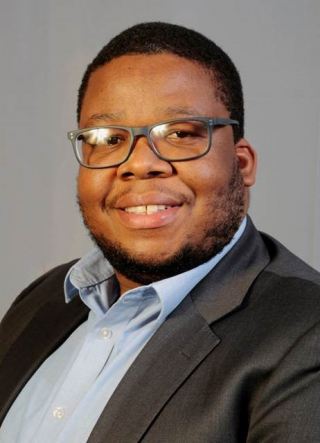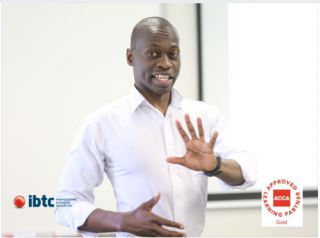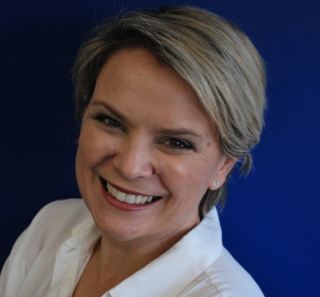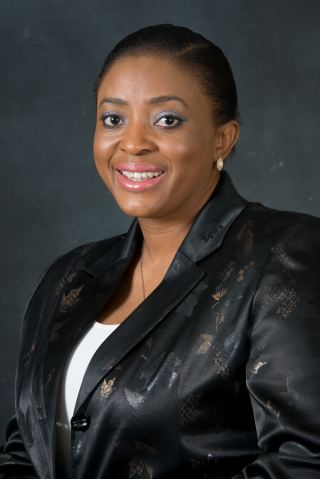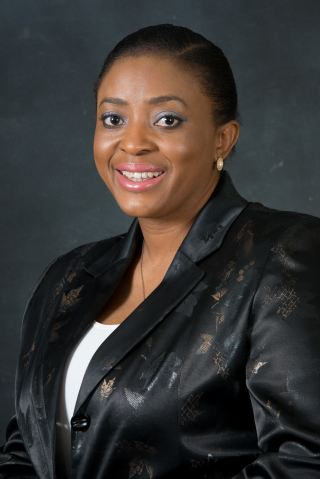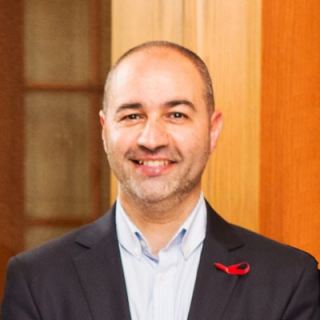Appointment of Urban Brew Studios Chief Executive Officer
Kagiso Media is pleased to announce the appointment of Calvin Sefala as Urban Brew Studios Chief Executive Officer with immediate effect.
Sefala, who has been the acting Urban Brew Studios (UBS) CEO for the past year, has proven his ability to lead Urban Brew Studios during very trying times. Calvin has a financial and administrative background was previously employed as an auditor for KPMG South Africa and Canada, Chief Financial Officer for Endemol Shine, Group Financial Manager Kagiso Media and Head of Finance at UBS.
"We are excited to have Calvin Sefala as the UBS CEO. He complements our strong performance-oriented culture, and we believe his impressive ability for execution and achieving results makes him the right choice to lead Urban Brew Studios as we prepare the business for the next phase of profitable growth," said Tshepo Setshedi, Urban Brew Studios Chairman.
About Urban Brew StudiosUrban Brew Studios is a leading facilities provider and a landmark of creativity for entertaining content. Our mission is to create technologically innovative content and provide facilities solutions that enable the production, distribution, and creation of inspiring content.
Contact: Lulama Mqina
Urban Brew Studios
This email address is being protected from spambots. You need JavaScript enabled to view it.
(+27) 0834595094
Get ready for your ACCA exams: How to Tackle your ACCA Advanced Taxation UK exam
At a recent online conference, a team of ACCA experts who are involved in reviewing and marking ACCA exams offered their insights on the Applied Skills, Strategic Professional and Options (UK tax) exams. The conference provided a unique opportunity for Approved Learning Partners, like IBTC, tutors and other strategic partners to come together, network, and gain practical insights into ACCA’s examinations.
During the conference they reviewed the 2018 September and December exams to provide students with direction and guidance when writing their exams this year. Here is what they had to say about The Advanced Taxation- UK
According to the examiners, there are a few changes in the ATX UK subject. The technical changes you need to be on the lookout for are the following:
- Deemed domicile changes for personal taxes (IT, CGT and IHT)
- Changes to corporate loss relief
- Income tax implications of lump sum payments
- Changes to SSE conditions
Apart from these changes, the examiners found that there are several areas that students struggle in and definitely need to improve on.
"Candidates need to consider the scenario given before they start writing their answer and not simply state general tax rules. A lot of students make this mistake. Students need to understand that each client has their own set of circumstances, which the tax rules must be applied to. Each scenario is unique and must be treated as such," said the examiners.
The examiners gave the following advice:
- Slow down
- Note initial thoughts and plan
- Think, then write
- Think, then calculate
- Clearly address the requirements and be specific
- Provide clear, short and concise explanations
- Avoid irrelevant explanations/calculations
- It is suggested that students spend 1.8 min per mark
About International Business Training College
IBTC is a registered course provider delivering classroom tuition and distance learning courses for internationally recognised professional qualifications, such as CIMA, ACCA, CAT, ICB and CFA - offering a combination of distance learning and classroom courses designed to prepare students for their professional examinations.
Operating from Cape Town since 1995, IBTC provides classroom courses in major cities around South Africa and a comprehensive Home Study programme supported by experienced international tutors.
All our courses include a complete set of internationally acclaimed study material which has been developed to ensure that students have maximum control over what they learn, the way they learn it, and the pace at which they work.
IBTC also works closely with a variety of professional institutions to support skills training and education. We believe in providing local students with access to international qualifications, bringing you closer to your professional goals and success in the workplace.
IBTC’s role is to support students in the accounting and business management field in successfully completing their exams.
Courses include:
- CIMA - Certificate, Operational, Managerial, Gateway Assessment, and Strategic Level
- ACCA - Fundamental & Professional Level
- FIA - Introductory, Intermediate, Diploma and Certified Accounting Technician Level
- CFA - Level 1 – 3
- ICB ACCOUNTING - Foundation, Intermediate, Upper Intermediate & Advanced Level
- ICB ADMINISTRATION - Foundation, Intermediate & Advanced Level
African Power, Energy & Water Industry Awards and African Power & Energy Elites join forces to celebrate continent’s energy pioneers
Two leading programmes celebrating excellence and innovation in the African power and energy sector, have joined forces to honour the continent’s leading energy projects and pioneers. The African Power & Energy Elites publication and the African Power, Energy & Water Industry Awards have aligned for their 2020 editions with a single nomination and selection process across a set of complementary categories.
For the last six years, the coveted African Power, Energy & Water Industry Awards have been taking place during African Utility Week and POWERGEN Africa conference and exhibition in Cape Town. Meanwhile, the prestigious African Power & Energy Elites publication has celebrated leadership and successful projects in the sector since 2016. The newly combined awards programme will be known as the African Power & Energy Elites and offer even more benefits, recognition and exposure for the finalists and winners, apart from the quality publication and glamorous awards evening. These benefits include access to, and speaking opportunities at leading energy events on the continent, a seat at the awards evening, a VIP tour of Cape Town and surrounds and an on-camera interview at the Awards evening.
The respective Elites categories are focused on excellence in leadership and pioneering projects and are applicable to both the public and private sectors, extending across power generation, transmission and distribution, water, independent power producers and project developers. The final selection of African Power & Energy Elites projects and leaders is made by an external advisory board composed of experienced industry figures from around the world
Nomination categories
Leadership
These are industry influencers who are innovative in their leadership approaches and strategies to improve the greater power and energy, and water value chain on a regional or country level. These leaders can be active in the private or public sectors and can include academia. Their influential role should be setting benchmarks in their respective industry sectors including, but not limited to, project design and development, engineering, technology and innovation, data related projects, mentoring and coaching of colleagues, legislation and finance.
Generation Innovation and Optimisation
Projects in which electricity producers have improved thermal power generation efficiency and/or capacity by developing and implementing advanced and innovative technology and solutions into an existing or new power plant. Things to consider include reduced operational or deferred capital expenditures, carbon and other emissions reductions, life extension, and plant upgrades. This category is applicable to projects that fall within either small, medium and large-scale.
Renewable Energy Generation Innovation and Optimisation
Projects in which electricity producers have utilised renewable power generation and new business offerings to meet growing customer demand for cleaner energy options. This can include the utilisation of blockchain or peer to peer trading facilitation, complex stakeholder engagement, utility facilitated residential storage or a complete restructuring of a business to accommodate the technology. This category is applicable to projects that fall within either small, medium and large-scale.
Rural Electrification
Electrification projects that have made a considerable positive impact to increasing energy access and electrification rates in urban, rural and informal settlements. These projects can be initiatives driven by government, private developers, or public institutions. The project can include any form of technology that increases power distribution to unelectrified communities for use in homes, schools, healthcare facilities, agriculture, and small businesses.
Transmission & Distribution
Projects that have provided growth in the transmission and distribution of electricity either locally, nationally or regionally. These projects can include LV, MV and HV new build programmes, maintenance projects, service delivery initiatives, technology roll-out programmes, revenue protection measures, technical and non-technical loss reduction, grid integration, and initiatives to increase network stability. Projects should have faced complex challenges.
Smart Cities
Projects undertaken as part of a smart city initiative which have driven an integrated energy, transportation, water or gas system as part of an overall city plan. Initiatives can include increased access to data which has led to energy, water or gas savings or enhanced management, or the overall implementation of a water, gas or electricity management and/or supply programme, wastewater management, green buildings and energy efficient programmes, transportation within the energy efficiency framework.
Finance & Investment
These models should be exemplary in their fields which can be in the form of traditional financing models, FinTech and interactive platforms such as crowdfunding that attribute to the development of small, medium and large-scale power projects.
Digital Transformation
The most transformative product or project of 2019/2020 – this can include innovations across the water, power and energy value chain (generation; transmission; distribution). Additionally, innovation and progression in the use of data & analytics; significant meter rollouts; and innovations in research and development, training and skills development.
Deadlines
- 30 Aug 2019: Nominations close
- 30/31 Jan 2020: Digital publication is released to market on ESI Africa with the shortlisted people and projects
- 13 May 2020: Awards evening at African Utility Week and POWERGEN Africa
To nominate a person or project: https://www.clarion-events-group.com/AfricanElites_
Nominations Category descriptions can also be found at https://www.esi-africa.com/regional-news/africa/nomination-categories-african-power-energy-elites-2020/
The African Power & Energy Elites is an annual journal produced by ESI Africa in collaboration with the Clarion Power & Energy Series recognising industry achievements across the power and energy value chain.
African Utility Week and POWERGEN Africa is the flagship energy event organised by Spintelligent, a multi-award-winning Cape Town-based exhibition and conference producer across the continent in the energy, infrastructure, mining, real estate and agriculture sectors. Other well-known events by Spintelligent include Future Energy East Africa, Future Energy Nigeria, the Utility CEO Forums, Nigeria Mining Week and DRC Mining Week. Spintelligent is part of the UK-based Clarion Events Group and African Utility Week and POWERGEN Africa form part of Clarion Energy, which runs over 40 events that cover the oil, gas, power and energy sectors, making it one of Clarion Events’ largest portfolios.
Contacts
For exclusive sponsorship opportunities contact:
Errol Bryce: This email address is being protected from spambots. You need JavaScript enabled to view it.
Stephen Campbell: This email address is being protected from spambots. You need JavaScript enabled to view it.
Loudon Cito: This email address is being protected from spambots. You need JavaScript enabled to view it.
For nomination enquiries contact:
Ashley Theron-Ord: This email address is being protected from spambots. You need JavaScript enabled to view it.
Natalie Bacon: This email address is being protected from spambots. You need JavaScript enabled to view it.
Media contact
Senior communications manager: Annemarie Roodbol
Telephone: +27 21 700 3558
Mobile: +27 82 562 7844
Email: This email address is being protected from spambots. You need JavaScript enabled to view it.
The founder's story matters: Here is the story of IBTC and CEO Nikki Maritz
Over the last year we've been focusing a lot on growing the company and growing as leaders. One of the things I've learnt in the process is that the founder's story matters. The story of our past informs our future. Where we come from, says a lot about who we are and where we're going. So here is my story. The story of the origin of IBTC.
For this story, I must go right back to the start.
Leaders make more leaders
My first real job was at a private distance learning college. I stayed there for 12 years and had no plans to leave. It was a great place to learn and grow. One of my managers changed the course of my life. He was generous with his time and knowledge and gave me an opportunity to learn about business, strategy, finance, product management and people management. From him I learnt the value of reading business books and studying other companies. Under him, three of the four senior managers who reported to him went on to start their own businesses. In retrospect, he was a 'king maker' of sorts. Today I know that great leaders make more leaders.
The truth is that I didn't set out to become the CEO of my own college - it wasn't even in my frame of reference. But someone came along who believed in me and wanted the best for me - and in the process enabled me to achieve what I didn't even have the courage to dream.
Values matter
In 2008 my manager and I independently decided to leave the college after it changed hands. We felt the new owners didn't put the students first and blindly pursued money. We were more interested in adding value to people's lives and wanted to leave people richer because they bought from us, not poorer. Then an opportunity came along to buy a small tuition provider operating from Hout Bay and we felt it could be a place where we can live out our values. We raised some capital (which was an extremely stressful time) and bought this small college. There were only 2 permanent staff members (the owners) and a temp. We inherited the temp. Six months after we took ownership, Rob passed away. It was a huge shock to lose someone so unexpectedly and a daunting task that lay ahead of me. I felt I still had so much to learn, but also knew that I had learnt enough. So, I picked up the reigns, moved the company to Cape Town and started applying everything I knew.
Now it's 11 years later and we've grown tenfold. We have campuses in Cape Town Sandton and Pretoria and we've expanded our product range to include exclusive online classes. I really feel we've grown into a remarkable company with remarkable people and that the best is yet to come.
Pay it forward
The moral of the story is that someone believed in me and changed the course of my life. IBTC is my chance to pay it forward. It's a company where we pursue meaning over money - that means putting the student and their success first. It's a place where we recognise that people buy a promise from us and we must deliver on that promise. This holds true for members of our staff and our students. Everybody buys into the promise of IBTC - a promise of learning and growth, a promise of being taken care of and a promise of people believing in you and being generous with their time and knowledge.
IBTC aims to fulfil its promise to all stakeholders (staff first), of being a place where we build relationships, we grow, we deliver results and we give people remarkable moments.
Creative Africa Celebrates Creativity #AfricaMonth and Africa Day 25 May
Africa has creative talent to burn. We spoke to African creative leaders about how pan-African showcases like the Loeries, help promote African talent to the world – and why awards like these, inspire brands to be bolder, and do more creative and effective work.
There is a very human voice to African brand communication, as well as a sense of fun. Lesibane Mohale, Group Creative Director of Ogilvy Africa Group, in Ghana, admires the way “humour is weaved into communication messages”. In Africa, “telecommunications brands thrive on humour and simplicity to connect with consumers,” he says.
Many African creatives are driven by a belief that we can tell better stories by taking inspiration from each other, particularly from the unique and diverse creative resources across the continent. Angolan graphic designer Hilma Sassa feels that Africans don't yet fully value their creative industry and its importance in society, making it harder to get noticed, “As a creative, you may have more luck getting noticed beyond your country, and outside the continent, if you share your work on the international stage.”
That sentiment informs the work of the Loeries, the most prestigious creative awards across Africa and the Middle East. “Our mandate is to showcase the best creative work from the continent, of course. But, it’s equally about helping brands find the right creative team to help them realise their business goals,” says Andrew Human, CEO of the Loeries. “Countries such as Brazil and India are great examples of markets that have entered work into international award shows and won by leveraging locally relevant ideas backed by solid local consumer insights,” says Mohale.
“As a continent, we should champion work that feels unapologetically African so that we can showcase to the world what the continent is truly about.”
As Sassa puts it: “I am stimulated by the diversity of work created in Africa, which is deeply inspired by our culture and tradition. That signature makes it unique and different from the things we see out there.” A similar impulse drives Human, who urges more creatives from around the African continent to enter the Loeries. “The Loeries is the only award in Africa that is recognised by the global WARC Report, which makes the Loeries a unique platform for African excellence on the global stage.” Human says the international standing of the Loeries is the result of a commitment to high standards and an independent and objective judging process. “Every year, we host some of the world's top creative leaders to act as jury presidents, coupled with panels of leading experts from throughout the region. Their objectivity and expert insight is part of what makes the Loeries the benchmark.”
“Entrants know that their work is being held to the highest global standards, and it’s a unique opportunity for African creatives to show the world just how good they are.” About Loeries Africa Middle East: The Loeries, a non-profit company, is Africa and the Middle East’s premiere initiative that recognises, rewards, inspires and fosters creative excellence in the brand communication industry.
As the highest accolade for creativity and innovation across our region, the Loeries promotes and supports creativity by helping marketers, agencies and consumers appreciate the value of ideas and fresh thinking. Culminating in the biggest creative gathering in Africa and the Middle East, Loeries Creative Week Durban brings together the best innovative minds from our industry for a festival of networking, inspiring minds and recognising great work. Our region's creative economy is world-class and has great potential to grow and to offer employment to our talented youth. The growth occurring throughout Africa and the Middle East is very exciting, and a major focus of the Loeries is to increase the standard of brand communication in the region.
DEADLINE FOR 2019 ENTRIES EXTENDED TO 31 MAY
Major Partners: DStv Media Sales, Gearhouse
Category Partners: AB InBev, Barron, Brand South Africa, Facebook, Gagasi FM, Google, JCDecaux, Nando’s, Tsogo Sun, Vodacom, Woolworths
Additional Partners and Official Suppliers: AAA School of Advertising, Antalis South Africa, Aon South Africa, Backsberg, BEE Online, First Source, Fresh RSVP Guest Logistics, Funk Productions, Gallo Images, Grid Worldwide, Hetzner, Mama Creative, Newsclip, Paygate, Rocketseed, Shared Value Initiative, Shift Social Development, Vega School, VQI Communications Nigeria
Endorsed by: Association of Communication and Design, Brand Council South Africa, Commercial Producers Association, Creative Circle, EXCA, IAB, South African Institute of Architects, IID
Official Media Partners Between 10and5, Bizcommunity.com, Book of Swag, Brand Communicator Nigeria, Business Insider by Pulse, Campaign Middle East, Film & Event Media, Modern Marketing, The Redzone.
-- ENDS --
Twitter: @loeries Instagram: Loerieawards Facebook: The Loeries
Distributed on behalf of the Loeries by: Riana Greenblo Communications Date: May 16, 2019
For more information, interview requests or high-res images, please contact: Riana Greenblo on 011 3256006; 0825675159 or This email address is being protected from spambots. You need JavaScript enabled to view it.
Workshop will make you rethink the future of your business
Gauteng businesses wanting to take control of the growing digital disruption in their markets will be headed for “Own The Future” on Aril 8th. Led by digital strategy veteran Godfrey Parkin, Own The Future is a strategy workshop where participants will rethink their business models in the light of emerging scenarios for the immediate future.
According to Parkin, “In the past few years we have seen unprecedented numbers of established businesses suddenly going under. Most of them have no idea what happened. At the same time, new businesses or industries have come from nowhere to total domination almost overnight. Mastering disruption is not about digital transformation, or even about technology. It is about reading the trends in customer behaviour, seeing the emergent opportunities for improving customer experience, and being ready and willing to own them. Your business has to be where the ball is going to drop, instead of chasing after it when it is already too late.”
The workshop apparently can be a little uncomfortable, as change does not come without letting go of the past, or challenging wishful thinking about the future. The structured approaches used in the workshop make it easier to question established assumptions, become inspired and to move forward with confidence.
“People today are more easily manipulated, and more ready to try something new, than ever before,” says Parkin. “Privacy no longer exists. Technologies change exponentially, and customer behavior follows; most businesses change much slower, so their hold on customer loyalty erodes quickly. The gaps between what people want and what is delivered become expanding worlds of opportunity, or risk.”
Participants in the Own the Future workshop learn how to cut through the chaos of unpredictable change to build clearly focused strategies for success. They will gain a profound understanding of the most important digital and social trends, and will learn how to stay strategically competitive. They will also discover the tools and resources that can help them stay ahead of accelerating disruption.
Britefire, the producers of the workshop, assert that every industry and sector will change more in the next three years than in the past thirty. The conjunction of coming social, political, educational and technological changes creates an immediate future which has to be confronted realistically, with strategy and conviction. “You cannot succeed over the coming three years with the business models and customer experiences that sustained you till now. Own The Future will put you back in control of disruption, so it works for you rather than against you.”
Intriguing workshop topics include:
- World on the brink: societal and digital revolutions
- Innovation, disruption, hype and reality
- Methodologies for business model disruption
- Identifying your opportunities to differentiate
- Optimising the radical: from fragile to agile
- Creating and implementing your disruption strategy
The workshop is being held in the Sandton area on 8th April, and places are limited. Contact Britefire for details.
The painful burden women achievers never talk about
By Mosima Selekisho, director at Signium Africa (www.signium.co.za)
International Women’s Day (8 March) has a provocative theme this year – Balance for better and encourage action. Presumably, balance is currently poor and action is needed for women to reach their goals. Most would agree with this assessment and IWD commentators will doubtless interrogate ‘the usual suspects’ –cultural norms, patriarchy, resistance to change and the supposed failure of some women leaders to do more to uplift other women.
The cry that top women don’t do enough has become strident in recent years. I am well placed to judge. As a so-called head-hunter for executive talent, I interact with women at the top of large organisations and with a new generation of female go-getters. Women on the way up often complain senior female colleagues do little to help while those who have made it will sometimes admit as much.
Why don’t they? Conversations over several years suggest the reasons go beyond demands on time or disinclination to lend a hand on the basis that ‘nobody helped me so why should I smooth the way for this newcomer?’ Top women find it difficult to help because they themselves are wounded and live with a lot of internal pain. This is never admitted. One characteristic of top achievers is that they put on a good front. They always seem in control. This mask never slips. Perhaps it should. The pain is inevitable. Women give of themselves and live every day with issues affecting husbands and partners, children and family members.
Thoughtful, giving women carry unseen burdens, especially in Africa. The scrapes of children at school, financial obligations when you’re the biggest earner in an extended family, a spouse’s career difficulties, the problems of kids at university, even police enquiries affecting members of the wider family ... all these issues and more have to be handled day by day. The woman who supposedly has it all is expected to solve it all. That can mean anything from helping a sibling quit substance abuse to paying the legal fees of a partner facing litigation. What can women do about it? First, look in the mirror and confess the professional front has become a mask. Admit you have been carrying internal pain for years.
You might even be embittered by the thoughtlessness of others and their assumption that you will always cope. This gives you a chance to release the pain. Those who have gone along this road say honest discussion with those close to you gives the best chance of a pain-free future. The blame you cast on those around you will be replaced by deeper understanding while those close to you will realise they can’t simply add to your burden.
You also have a life. Women released from private pain have more time for colleagues. Greater rapport leads to greater willingness to help. Upliftment of others is natural after that. Wounded women find they also achieve career growth. The focus falls on blind-spots and getting the wider team to work toward a single vision. The top achiever begins to see areas in which she can also improve. Carrying burdens makes you strong, but you eventually stoop under the weight and see just one step at a time. You only see the big picture and help others when you put the burden down.
*Mosima Selekisho is a Director of Signium Africa (previously Talent Africa), a leading South African-based executive search and talent management company servicing sub-Saharan Africa.
-- Ends --
Website:www.signium.co.za
Tel: +27 11 771 4800
Issued By: Tale Spin Media & Marketing
Zelda Williams 082 461 0689 or Gillian Schmid 082 960 3233
This email address is being protected from spambots. You need JavaScript enabled to view it. | This email address is being protected from spambots. You need JavaScript enabled to view it.
Leadership going up a gear
Leadership going up a gear by Mosima Selekisho* director at Signium Africa (www.signium.co.za)
Corporate leadership in South Africa is being redefined. A ‘safe pair of hands’ is still required, but increasingly the focus is shifting to greater dynamism. At CEO level, more and more organisations are looking for go-getters who deliver results at pace. The change has been evident for some time but has reached critical mass in recent months as economic prospects have improved and private sector companies have sensed that opportunities for meaningful growth are at hand. Until recently, the incumbent CEO was often seen as the school principal who made sure everyone did their homework and stayed on top of their assignments.
This is changing at many firms. They have faced an economy in limbo for long enough and don’t want their own business to be locked in neutral forever. The demand is for an energetic motivator who does not waste time on formalities and drives hard for discernible results. In the past, the C-suite was characterised by emphasis on processes and detail. Research could be painstaking. Strategic deliberations might take months. Mistakes were avoided.
Costs were tightly controlled. But fast action to exploit fleeting opportunities was rarely seen. In contrast, the new priority when top talent is being sought is for an action man (or woman) who can turn strategy into reality without delay. The newcomer is expected to be technically accomplished, and relative youth is seen as an asset.
Industry outsiders may well make the shortlist, especially if a strong technically adept team is already in place. Some boards of directors are happy to press the ‘fast forward’ button, but still require the reassurance that solid foundations will not be compromised. In this scenario, they may specify a go-getter CEO who will be expected to work with a senior team capable of providing balance and continuity. Alternatively, the board may prefer to appoint a youngish operations officer, known for dynamism and results orientation. In these circumstances, the COO’s job is often beefed up to include a strategic dimension.
The incentive for the incoming COO is that the scene is clearly being set for the newcomer to take the top job once initial dynamism is tempered by greater acquaintance with company culture. In all scenarios, the new CEO or member of the leadership team is expected to be on top of digital developments and new media platforms. The days are gone when CEOs regarded digital devices and communication as something their PAs sorted out.
Feedback following the placement of this new generation of CEOs is largely positive. Many organisations are ripe for reinvigoration and a rapid mood change can be achieved. However, one shortcoming has been noted. The go-getter looks for results rather than consensus. Therefore, listening skills may require work. The public sector has yet to embrace the need for more aggression and dynamism at the top.
A deliberate ‘team player’ is the standard requirement. However, SOEs know times are changing and sometimes a preference is expressed for ‘a new face without baggage’. The good news is that a fresh breed of leaders is emerging and is fully capable of optimising the potential for a new beginning within major organisations … private or public.
*Mosima Selekisho is a Director of Signium Africa (previously Talent Africa), a leading South African-based executive search and talent management company servicing sub-Saharan Africa. www.signium.co.za
Corporate narcissism… SA’s secret curse - By Annelize van Rensburg (Signium Africa)
Corporate narcissism…SA’s secret curse - By Annelize van Rensburg* (www.signium.co.za)
It is the unspoken curse stalking corporate South Africa. Few people talk about it but many executives encounter it and may be vaguely – or acutely – aware of the danger to organisations and careers. The potentially toxic issue is corporate narcissism and its personification, the corporate narcissist. Psychologists, consultants and corporate head-hunters have been aware of the issue for many years, though it came into sharp focus internationally following the 2008 financial crisis as the egotism of some business leaders may have paved the way to the Great Recession. Specialists describe corporate narcissism as a corporate culture characterised by excessive pride, leading to destructive behaviour and strategies that boost personal egos rather than a company’s long-term prospects. It is often found in large firms, especially those with clear hierarchies as corporate narcissists favour structures that support their power and protect their position. One chartered psychologist notes negative correlation with honesty and humility, yet positive correlation with openness and extroversion. Translation? A corporate narcissist initially appears charming and open. He or she makes a great first impression and exploits it to win high ratings for performance. Sometimes performance can be impressive, but narcissists are likely to ride early successes for all they are worth to secure personal advantage. Narcissists steal credit for the work of others and minimise the contribution of subordinates. Narcissists are manipulative and enjoy the trappings of success … the best office, first-class travel and accommodation, luxury cars and celebrity lifestyle. A corporate narcissist may build a reputation as a stellar deal-maker and financial wizard. He (or she) is the corporate rain-maker with a knack for building a network of admirers and praise-singers. Peers and subordinates often do the real work while the manipulator hogs the limelight. Those with a different perspective are marginalised. Mistakes may be covered up and blame wrongly apportioned. Abuse and erosion of ethical values set in. Anyone challenging the narcissist is ostracised. An ace manipulator undermines the self-esteem of others.
Colleagues may find themselves working harder and harder as they are led to believe under-performance is their fault. Three consequences may manifest:
victims (frequently talented individuals) refuse to be victims any longer and quit, hurting organisational performance as staff turnover rockets victims become depressed and demotivated (health and work suffer) victims become whistle-blowers as egotism may lead to mis-statements of fact, even fraud (though raising a red flag may initially do more harm to whistle-blowers than narcissists who supposedly do no wrong). The extent of the local challenge is not only apparent from anecdotal reports, but from feedback given by executives looking to leave seemingly successful organisations.
Upon close questioning, they reveal the angst, anger and frustration of working alongside corporate narcissists in several sectors. There is some good news. International experience shows individuals can resist manipulation by setting clear boundaries and refusing to be sucked into the sycophantic culture that often surrounds a narcissist. You can’t change narcissists, but you can change your reaction to them by refusing to do their jobs or cover for them. Corporate scandals and persistent organisational under-performance are also beginning to alert boards to risks posed by corporate narcissism. Well-informed boards know self-confidence is good, self-absorption bad. With the help of skilled head-hunters, they are becoming better at spotting the difference. Taking a good hard look is a good start if we wish to combat the toxic effects of corporate narcissism. It then becomes possible to build cohesive teams that deliver good, consistent results without glory-hunting … or narcissism.
*Annelize van Rensburg is a director of Signium Africa (previously Talent Africa), a leading recruitment company based in South Africa offering executive head-hunting and leadership consulting - servicing sub-Saharan Africa. www.signium.co.za
Signium Africa and Riverwaves sign strategic HR partnership
South African talent search specialists *Signium Africa and UK consultancy *Riverwaves today announced the launch of a strategic partnership to bring world-leading competency-based HR solutions to companies across sub-Saharan Africa. Signium Africa is primarily known for head-hunting top executive talent for some of the continent’s leading corporates and state-owned enterprises. Riverwaves is a global leader in the optimisation of ‘people capability’ through the customisation of competency-driven HR models designed to energise and strengthen corporate teams.
Following in-depth exposure to Riverwaves’ Intellectual Property (IP) and proprietary modelling tools, Signium Africa is positioned to apply its partner’s globally respected competency framework, build internal capability and develop HR solutions specifically crafted to meet the unique needs of each client company, at every organisational level.
Said Michelle Moss, Director, Leadership Consulting, at Johannesburg-based Signium Africa: “We have offered competency-based services for some time. Now the partnership with Riverwaves enables us to deliver world-leading competency solutions that have been proven internationally across multiple industries and deliver measurable benefits, no matter what the nature of the team or level of responsibility.
“Access to innovative IP of this quality meets a huge need as the challenge in South Africa and so many countries across the continent is to make the most of available talent, either through internal development or external recruitment. The competency fit has to be optimised and Riverwaves models are designed to do just that.” Hisham El Badawy, Non-Executive Board Member of Riverwaves, noted: “The relationship with the seasoned professionals at Signium Africa opens up exciting opportunities in a region with boundless potential.
Many markets in sub-Saharan Africa show significant growth, creating challenges for business and state enterprises. “Unlock the potential of the people of sub-Saharan Africa and you unlock the potential of the region as a whole. Worldwide experience over more than 20 years tells us the key is professionally implemented competency-based HR solutions with the capacity to invigorate both the individual and the organisation. “The link-up with Signium Africa gives us the ability to roll out those solutions via a reputable partner with intimate knowledge of the region.” Ends
*Signium Africa, previously Talent Africa, is a leading South Africa-based executive search and talent management company with reach across sub-Saharan Africa. www.signium.co.za
*Riverwaves, is an HR consulting firm that helps companies realise the potential of their people. They operate globally out of the UK with a strong business partner network. www.riverwaves.co.uk

